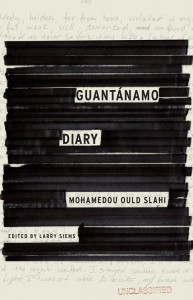January 29, 2015
Three guesses which book won’t be available at the Guantanamo Bay Library
by Liam O'Brien
 Prison libraries aren’t just where you stage a furtive conversation between prisoner characters, because obviously that’s where guards won’t notice anything; they’re a key element in the rehabilitative mission. The carceral library can focus national priorities when it comes to prison reform; in Britain, where it’s unsuccessfully held up as an excuse to withhold outside reading material, and in Italy, where it’s a slow but steady means of chipping away at your sentence.
Prison libraries aren’t just where you stage a furtive conversation between prisoner characters, because obviously that’s where guards won’t notice anything; they’re a key element in the rehabilitative mission. The carceral library can focus national priorities when it comes to prison reform; in Britain, where it’s unsuccessfully held up as an excuse to withhold outside reading material, and in Italy, where it’s a slow but steady means of chipping away at your sentence.
So what to make of the library in possibly the most controversial US prison of the last decade? I’m talking of course about Guantanamo Bay, the not-in-any-way-secret gulag in that country we don’t talk to where we house over 100 definitely-not-prisoners-of-war. We’ve covered this library’s contents before, and how they’re selected, including another notable exemption. Most of the books are commercial successes written by name authors, the kind of books you’d see on a dollar rack – well-worn, popular, and anodyne.
But VICE reports that Guantanamo’s prisoners won’t have access to one particular new release— Guantanamo Diary by Mohamedou Ould Slahi. Prisoners, of course, that count Slahi as one of their own.
Guantanamo spokesman Captain Tom Gresback told VICE News that “at this time” the detainee library has no intention of purchasing Mohamedou Ould Slahi’s memoir Guantanamo Diary, which cracked Amazon’s top 100.
“The detention center library at Guantanamo has more than 19,000 titles,” Gresback said. “Books are provided as a means of intellectual stimulation. All titles available are culturally sensitive, non-extremist in nature and generally non-controversial.”
The library has strict monitoring guidelines to ensure that prisoners don’t use the books as a means of communication, and reading a fellow prisoner’s years-old account of his human rights being abused would definitely fall under that banner. But really, it’s all part of the complete control of the prisoners’ incentive and reward system. Gitmo, like all prison libraries, has broad and stringent policies regarding the content of the books they offer, so while it’s no surprise that Slahi’s existentially terrifying descriptions of torture wouldn’t pass muster, there’s an absurdist element to the idea that a man’s diary, which took years to become public, is still off-limits to him.
Gresback, the Guantanamo spokesman, would not directly answer whether Slahi would ever be permitted to have a copy of his own book. But he suggested that it’s unlikely and said the same rules would apply to other detainees. Additionally, detainee lawyers would not be allowed to bring copies of Guantanamo Diary to their clients.
“Detainees are afforded legal mail exchanges with habeas and defense counsel,” Gresback said. “Books provided by counsel to detainee via legal mail are required to be related to that specific detainee’s habeas or commission case. Books provided to detainees via non-legal mail are subject to content review criteria.”
With increasing but seemingly unending national exhaustion from the War on Terror, and President Obama’s recent empty assertion that Guantanamo should and will be closed, we can’t determine how much greater our legacy of shame, courtesy of a hypertrophic and cavalier intelligence apparatus, will spread. But as stories like this continue to find an audience, despite heavy redactions, their truth continues to seep out. Journalists connect the dots, and instead of pseudonyms or just a bar of black ink, we have Richard Zuley and Alfreda Bikowsky.
Guantanamo Bay’s library won’t carry Slahi’s diary, or (I wager) the Senate Intelligence Committee Report on Torture, but that’s actually a best case scenario. Because the entire library and the facility that contains it should not still exist.
Liam O'Brien is the Sales & Marketing Manager at Melville House, and a former bookseller.